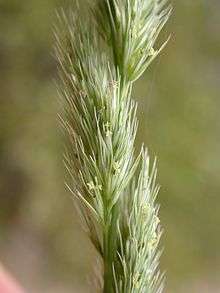Muhlenbergia glomerata
| Muhlenbergia glomerata | |
|---|---|
 | |
| Scientific classification | |
| Kingdom: | Plantae |
| (unranked): | Angiosperms |
| (unranked): | Monocots |
| (unranked): | Commelinids |
| Order: | Poales |
| Family: | Poaceae |
| Genus: | Muhlenbergia |
| Species: | M. glomerata |
| Binomial name | |
| Muhlenbergia glomerata (Willd.) Trin. | |
Muhlenbergia glomerata is a species of grass known by the common names spiked muhly and marsh muhly. It is native to North America, where it occurs across Canada and the northern half of the United States.[1]
This grass produces branching stems up to 1.2 meters tall from a network of rhizomes. The inflorescence is a narrow panicle of spikelets which are up to 8 millimeters long.[1][2]
This grass is found in moist areas in various habitat types. It grows in bogs, marshes, meadows, ditches, fens, swamps, riversides and lakeshores, hot springs, wet forests, alvars, and seasonally flooded land. It occurs in cooler, more moist places than many other C4 species. It occurs less often in dry places.[1]
References
- 1 2 3 Zouhar, Kris. 2011. Muhlenbergia glomerata. In: Fire Effects Information System, [Online]. U.S. Department of Agriculture, Forest Service, Rocky Mountain Research Station, Fire Sciences Laboratory.
- ↑ Muhlenbergia glomerata. Grass Manual Treatment.
External links
This article is issued from Wikipedia - version of the 6/10/2013. The text is available under the Creative Commons Attribution/Share Alike but additional terms may apply for the media files.
